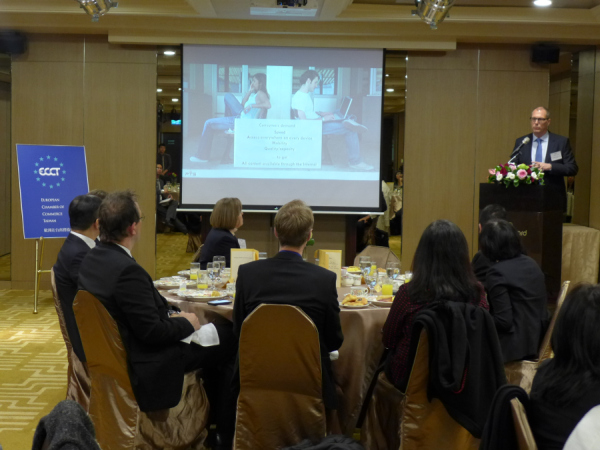Special Breakfast with the Swedish telecom regulator

Marby described the job of the Swedish Post and Telecom Regulator (PTS) as giving users a choice. Explaining his point he noted that it is easy for monopolies to develop in any given market and it is the regulator's main task to ensure that monopolies do not form and consumers always have enough choices. He joked that no matter what the regulator does, it is impossible to please everyone. If regulations are too strict, market participants will complain. If there is not enough competition and certain companies are making too much money, consumers will complain.
Sweden has one of the world's most advanced telecommunications regulatory system and technology. It is also a good example for the world for a number of reasons. The country is very sparsely populated in certain areas (the country's 9.5 million people occupy less than 7% of the land space) yet the authorities have made a commitment to ensure that everyone everywhere has access to broadband internet. According to Marby, the country is very close to fulfilling its commitment as fewer than 300 households now lack access. Moreover, over 99% of people have access to Long Term Evolution (LTE or 4G coverage).
While in the past telephone lines and later television reception were regarded as the most important technology, consumers now believe that the internet is the most essential communication medium. Consumers are now demanding internet access everywhere and at a fast speed.
The service provider is no longer important to most consumers and this has put a lot of pressure on traditional business models. As the speed of transferring data has increased along with advances in technology, the revenue per gigabyte has dropped steadily. Operators are still getting the largest portion of their revenues from text messages, followed by voice. However, voice traffic has peaked while mobile data traffic, in contrast is booming.
New business models are emerging. Operators are now seen mostly as infrastructure providers, commanding lower revenues and margins (although they will stabilize at a certain level) while service (and especially content) providers will be able to command higher margins.
Spectrum belongs to citizens and it is goldmine, according to Marby. Some countries have cashed in and used enormous funds raised from selling spectrum licences to pay off debt or for other projects but Sweden is using the windfall to ensure that all citizens benefit by providing internet coverage to all and maximizing efficiency and competition. This implies making the best use of available spectrum and ensuring a level playing field and sufficient competition. Despite its relatively small population, Sweden issued six national licences. In addition, the PTS approach has been to remain technology neutral and allow the market to decide the best technology. This has worked well as Sweden's LTE roll-out actually started well ahead of the rest of the world in December 2009, is almost complete, and the focus is now on the next generation (5G).
While PTS is completely independent from political influence, it is also sensible regarding regulation, cognizant of the danger that overregulation can stifle innovation. Marby said that PTS sets the regulatory framework but prefers it if operators sort out difficulties for themselves. With regard to pricing, for example, he said that prices evolve naturally in a competitive environment, implying that the regulator does not need to get involved as long as competition remains strong.
